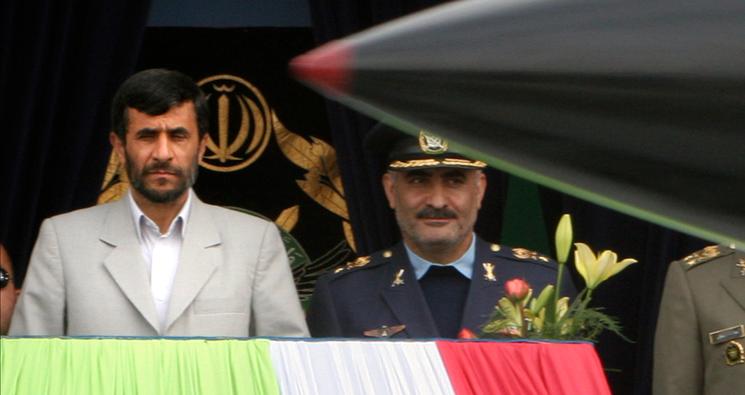Less than “One Year Remains to Stop Iran”
1.31.2012 Update: The Washington Post has an important article on Iran's willingness to attack the U.S., "Iran, perceiving threat from West, willing to attack on U.S. soil, U.S. intelligence report finds."
U.S. intelligence agencies believe that Iran is prepared to launch terrorist attacks inside the United States in response to perceived threats from America and its allies, the U.S. spy chief said Tuesday.
Director of National Intelligence James Clapper said in prepared testimony that an alleged Iranian plot to assassinate the Saudi ambassador in Washington that was uncovered last year reflects an aggressive new willingness within the upper ranks of the Islamist republic to authorize attacks against the United States.
You can read the entire article here.
Ronen Bergman, an analyst for the Israeli newspaper Yedioth Ahronoth and featured expert in the ACLJ’s documentary “The Export: Radical Islam’s Map to the End of Democracy,” lays out a compelling case for the true threat posed by Iran in his article in the New York Times Magazine, “Will Israel Attack Iran?”
Based on conversations with Israeli Prime Minister Benjamin Netanyahu and Former Prime Minister of Israel and current Minister of Defense Ehud Barak, Bergman points to three key factors to determine when or if Israel will attack Iran to prevent the development of nuclear weapons:
1. Does Israel have the ability to cause severe damage to Iran’s nuclear sites and bring about a major delay in the Iranian nuclear project? And can the military and the Israeli people withstand the inevitable counterattack?
2. Does Israel have overt or tacit support, particularly from America, for carrying out an attack?
3. Have all other possibilities for the containment of Iran’s nuclear threat been exhausted, bringing Israel to the point of last resort? If so, is this the last opportunity for an attack?
He explains, “For the first time since the Iranian nuclear threat emerged in the mid-1990s, at least some of Israel’s most powerful leaders believe that the response to all of these questions is yes.”
[Barak] warned that no more than one year remains to stop Iran from obtaining nuclear weaponry. This is because it is close to entering its “immunity zone” — a term coined by Barak that refers to the point when Iran’s accumulated know-how, raw materials, experience and equipment (as well as the distribution of materials among its underground facilities) — will be such that an attack could not derail the nuclear project. Israel estimates that Iran’s nuclear program is about nine months away from being able to withstand an Israeli attack; America, with its superior firepower, has a time frame of 15 months. In either case, they are presented with a very narrow window of opportunity. . . .
For their part, the Israelis suspect that the Obama administration has abandoned any aggressive strategy that would ensure the prevention of a nuclear Iran and is merely playing a game of words to appease them. The Israelis find evidence of this in the shift in language used by the administration, from “threshold prevention” — meaning American resolve to stop Iran from having a nuclear-energy program that could allow for the ability to create weapons — to “weapons prevention,” which means the conditions can exist, but there is an American commitment to stop Iran from assembling an actual bomb.
“I fail to grasp the Americans’ logic,” a senior Israeli intelligence source told me. “If someone says we’ll stop them from getting there by praying for more glitches in the centrifuges, I understand. If someone says we must attack soon to stop them, I get it. But if someone says we’ll stop them after they are already there, that I do not understand.”
Matthew Kroenig, the Stanton Nuclear Security Fellow at the Council on Foreign Relations who was a special adviser to the Pentagon from July 2010 to July 2011, says:
“The future can evolve in three ways . . . . Iran and the international community could agree to a negotiated settlement; Israel and the United States could acquiesce to a nuclear-armed Iran; or Israel or the United States could attack. Nobody wants to go in the direction of a military strike,” he added, “but unfortunately this is the most likely scenario.”
Bergman notes that Israel’s Vice Prime Minister Moshe Ya’alon, who is also featured in the ACLJ film The Export, points out the worldwide implications of an Iranian nuclear weapons program.
[T]his is not just an Israeli-Iranian dispute, but a threat to America’s well-being. “The Iranian regime will be several times more dangerous if it has a nuclear device in its hands,” he went on. “One that it could bring into the United States. It is not for nothing that it is establishing bases for itself in Latin America and creating links with drug dealers on the U.S.-Mexican border. This is happening in order to smuggle ordnance into the United States for the carrying out of terror attacks. Imagine this regime getting nuclear weapons to the U.S.-Mexico border and managing to smuggle it into Texas, for example. This is not a far-fetched scenario.” . . .
This is a scenario that Bergman says is already playing out with Israel. He writes, “According to Israeli intelligence, Iran and Hezbollah have also planted roughly 40 terrorist sleeper cells across the globe, ready to hit Israeli and Jewish targets if Iran deems it necessary to retaliate.”
Bergman concludes, “After speaking with many senior Israeli leaders and chiefs of the military and the intelligence, I have come to believe that Israel will indeed strike Iran in 2012.”
I encourage you to read this entire eye-opening article on Iran’s threat.

